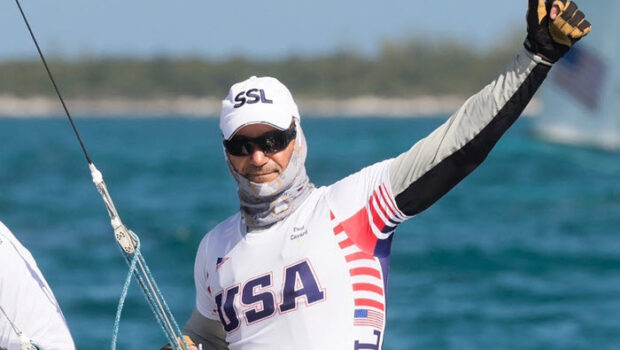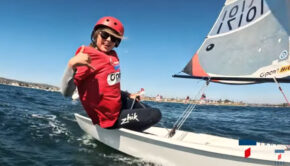Paul Cayard: Letting the dust settle
Published on March 16th, 2023
Recent resignations have shaken the U.S. Olympic Sailing Program, and the ripple effect has seen the United States Sailing Foundation, a fundraising entity to support the program, also endure departures. Scuttlebutt editor Craig Leweck checked in with Paul Cayard, former Executive Director of U.S. Olympic Sailing, for his reaction:
What was the status of the US Olympic Sailing Program when you took over two years ago?
There was a $2.8M financial deficit, four coaches, an experienced staff, and no medal contenders.
Your goal when taking over the job was podium performance by Los Angeles 2028. As you got more into the job, how did that position evolve?
I always said the hill to the top would be steep and long. I was undeterred because I believe in our athletes, my staff, and the power of America. I feel that the USA has the talent to podium in five classes in LA 2028. We need to build the support structure to get the athletes and coaches to that level. Project Pinnacle is that strategy. At the same time, we need to continue to cultivate the Pipeline of talent behind them for sustainability. Project Pipeline is that strategy.
The US Olympic and Paralympic Committee requires US Sailing to manage the US Olympic Sailing Program. But unlike other Olympic sports, Sailing is significantly more diverse. How did the USOPC mandate impact your ability to operate?
Running an elite sports team, striving to be the best in the World, under the guidance of a member services organization with a volunteer Board of Directors, is not a recipe for success… for either organization.
When you were hired in March 2021, it was at time in which US Sailing viewed a successful Olympic team as an opportunity to inspire young sailors and motivate boaters to become members. In what ways did US Sailing support this mission?
The first point of the US Sailing Strategic Plan is “High Performance and Olympic Success”. Ironically, the US Sailing Association contributes nothing to its Olympic department. At times, there were large bureaucratic stones thrown into our road. The most recent example was, US Sailing charging its Olympic department an administrative fee of $976K for 2023, up from $555K in 2022. I found it hard to explain this to donors and sponsors who intended to support athletes.
You had previously been a member of the Olympic Sailing Committee. What was the purpose of that entity, and why does it no longer exist?
In past practice, US Sailing delegated its Olympic obligations to a committee, the Olympic Sailing Committee. While the OSC had a greater level of Olympic experience than the Board, it had no executive power. It was a flawed structure.
And now the Olympic program is overseen by the US Sailing Board of Directors. How has that impacted the program?
I was warned not to make my efforts under the US Sailing umbrella. As a proud American sailor and two-time Olympian, I wanted the USA to be unified. For 21 months, we were granted autonomy, and we made significant progress. Unfortunately, just two years into a 7-year project, conflicting agendas impaired the Board’s vision, and the Olympic program has suffered significant damage.
What specific progress did the Olympic program make under your leadership?
Thanks to strong support from our donors, AmericaOne, Quantum Racing, Kilroy, Gill, Harken, Yeti, Seimens, and several other corporate sponsors, we made progress in these key areas:
• Project Pipeline: Increased support of this 2014 strategy helping U19 sailors achieve excellence led by AmericaOne and Quantum Racing. The USA won more than 20 medals at the Youth World Championships in the period from 2016 through 2022 including being top nation in 2017.
• Domestic platform: Created a circuit of six domestic Olympic regattas annually, the most recent of which brought 200 competitors from 30 nations to our waters.
• Repatriating the Olympic Trials. Regaining control of our Olympic selection trials, having a “winner” represent our country, and inspiring the next generation.
• Squad mentality: It’s not about being the best in America, it’s about being the best in the World. When our athletes buy into working together, they will push each other to new heights. Our iQ Squad is the poster child of squad mentality.
• Established a base in Marseille: Being one of nine nations with a base at the Olympic site is very valuable for our athletes.
• Becoming a Team: Olympic sailing has 10 disciplines. However, commonality exists: fitness, nutrition, meteorological knowledge, strategy and tactics, and services like food programs and physical therapy. Becoming one team in the broader sense adds power to each individual. Two all-team camps launched this concept for Team USA.
• Coaching: In 2021, US Sailing paid for full time coaching in four classes. In 2023, all 10 were covered plus increasing coaching for the Olympic Development Program thanks to Quantum Racing. Bringing coaches like Robert Scheidt to the team creates positive change on many fronts.
• An efficient organization: The Olympic Sailing Program rebuilt its operations staff. While increasing the budget by 60%, we also increased operational efficiency coming in under budget each year and creating a positive cash balance of $2.25M at year end 2022.
• Increased Funding: We built a support structure of donors and sponsors who believed in the mission and the vision of how we were going to get there. That vision and leadership garnered $18M in commitments. We also got a large boost ($7.5M) toward our $100M endowment thanks to Treecie and Ding Schoonmaker.
The USOPC requires one third of the US Sailing Board of Directors to be athletes of some distinction. How did this requirement impact the operation of the US Olympic Sailing Program?
Like all new rules, USOPC and each sport’s national governing body are gaining experience with this requirement. I believe the athletes voice must be heard. I also believe this requirement puts a new responsibility on the experienced Board members.
It had been said that concerning issues within the program had been brought forth from the athletes? What were the problems?
Change is difficult. There will always be complaints. Remaining mediocre was not an option for me. Since my departure, the number emails, texts and phone calls I have received from the athletes, expressing appreciation for what we were building, has been heartwarming. It was my honor and privilege to work with them on their journey to excellence.
Can a team leader make everyone happy?
It is hard to please everyone all the time. That said, a good leader leads with commitment, charisma, passion that is infectious and builds a winning culture. I certainly strive to do that in every program I have ever been involved with.
Following your resignation, the US Team’s high performance leadership group also resigned. What should we read into that?
Simply that they did not believe in the reorganization promulgated by the Board. This is the third time in three quads that the volunteer board has stepped in and changed the Olympic team strategy and leadership without any input from the professionals hired to build (and rebuild) the program. Obviously, the Olympic staff felt disrespected by this. Any reasonable person would take that as not being considered of value, and leave. Exemplifying their passion for the athletes, Luther Carpenter and Charlie McKee are traveling to Palma this week to coach their athletes on their own nickel!
The United States Sailing Foundation has also endured resignations following your departure, with Chairman Bill Ruh and Treasurer Johnny Lovell resigning. How is this connected to the changes occurring with the US Olympic Program?
Bill Koch, Tom Whidden, and several others followed as well. Like the Olympic staff resignations, these Foundation resignations are directly related to the changes made by the US Sailing Association Board. Bill Ruh was Chairman of the Foundation and along with myself, primarily responsible for raising $18M. Johnny Lovell is a 4-time Olympian and Silver medalist. He felt we were on the right path. Bill Koch and Tom Whidden need no introduction. We were all about winning!
You remain passionate about raising the standard of the US Olympic Sailing Program, but there are people that contend the obstacles in the country are too great. How do you feel now?
I love the USA and what it stands for. My immigrant father found great opportunity in the USA. At the 1984 Olympics, I marched into the LA Colosseum with Evander Holifield, Michael Jordan, Carl Lewis, Mary Lou Retton, Edwin Moses, and 495 other great American Athletes. The Sailing Team won Gold and Silver in every class. The sport of Sailing has given me so much. I wanted to pay it forward. I will remain the biggest fan of our USA athletes. I know our athletes can get back to the top of the podium. Go USA!









 We’ll keep your information safe.
We’ll keep your information safe.